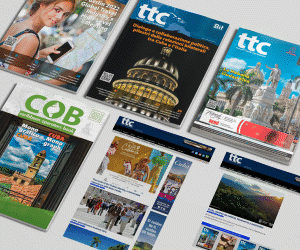
Her Majesty’s Ambassador, Dr. Antony Stokes LVO, signs the contracts for three cooperation projects with the Cuban science institution CIGB. Photos: courtesy of the british Embassy in havana
The British Embassy in Havana deploys bilateral programs in priority areas such as collaborative projects in response to COVID-19, culture and creative industries, and education, among others.
The Program of Projects in Cuba during the 2020-2021 biennium contemplates a series of small-scale actions executed with funds from the International Program of the United Kingdom Foreign, Commonwealth and Development Office (FCDO) that will help increase health resilience, promote research on vaccines and drugs, and mitigate the economic impact of the pandemic in that Caribbean country.
The British diplomatic mission supports the Cuban Neuroscience Center (CNEURO) in its effort to optimize diagnoses and treatments to minimize brain damage caused by COVID-19. Through this initiative, which is carried out in conjunction with the University of Oxford, the Cuban institution will have access to UK-Biobank data related to the aforementioned disease; brain disorders associated with the disease in recovered individuals will be able to be characterized and a DNA biobank developed with patient samples.
In addition, CNEURO will implement a protocol to assimilate and use non-invasive ventilators (Continuous Positive Airway Pressure, CPAP), to improve the treatment of respiratory deficits related to COVID-19. Cuban engineers will be trained to manufacture the UCL-CPAP equipment and assemble prototypes in Cuba, as well as intensive care specialists, to use them in therapy.
Developed by the University College London Hospital in conjunction with Mercedes AMG High Performance Powertrains, the UCL-CPAP enables shorter therapy with better results for the patient and for healthcare resources. The UCL-Ventura consortium released the full design and manufacturing instructions completely free of charge; the designs have been downloaded by around 1,800 governments, industries, health experts and academics in 105 countries.
“Both projects are innovative research within the portfolio of projects aimed at fighting the pandemic in Cuba, and an important resource to improve the prevention, diagnosis and treatment of current and future diseases,” acknowledged Dr. Mitchel Valdés-Sosa, director of CNEURO.
Similarly, the Embassy is also collaborating with the Center for Genetic Engineering and Biotechnology (CIGB) in phase 1 of a clinical trial of the CIGB2020 vaccine to optimize immunization, testing various means of administration in increasing the expression of the receptor gene to detect SARS-CoV-2 RNA.
With the CIGB itself, the UK contributes to the exploration of the antiviral activity of CIGB-300 in SARS-CoV-2 positive patients through a clinical trial; as well as in the development of a diagnostic test for the detection of the SARS-CoV-2 serological antigen, with the objective of carrying out capture tests of this antigen for the early diagnosis of the disease; a project that includes the generation of monoclonal and polyclonal antibodies against the SARS-CoV-2 nucleocapsid protein, the obtaining of an enzyme linked to the immunosorbent assay (ELISA) for the detection of the SARS-CoV-2 antigen in humans, and the assembly of a lateral flow test for the detection of antigen in humans at healthcare points.
Regarding these projects, Dr. Eulogio Pimentel, general director of the CIGB, stated that “in the face of the pandemic in Cuba, the possibility of developing specific and effective drugs against this disease has been essential. In this sense, we appreciate the contribution of the United Kingdom to be able to acquire multiple reagents and materials necessary to ensure the progress of the three mentioned actions.”
As to the mitigation of the economic impact of COVID-19 in Cuba, the Embassy supports research carried out by the Center for Studies of the Cuban Economy of the University of Havana, geared at transforming the commercialization of fresh food. This intention includes, in turn, the holding of workshops on food production and food safety, markets and value chains, as well as conducting research on related topics.
The diplomatic representation of the United Kingdom in Cuba also accompanies the private sector, with the aim of fostering a space for exchange and collective reflection in the search for post-COVID-19 entrepreneurial initiatives and definition of the strategies that said sector could implement to adapt to the new normal.
Her Majesty’s Ambassador, Dr. Antony Stokes LVO [Lieutenant of the Royal Victorian Order, a distinction granted for services carried out on behalf of the Royal Family], has defined the precept that “cooperation between countries is essential in responding to the challenges posed by COVID-19. In addition to putting the world’s health systems to the test, the pandemic has impacted our economies. These projects promote bilateral collaboration in these two key areas.”
On a universal scale, he continued, “the UK government is committed to promoting global collaboration in the development of and access to vaccines, tests and treatments. Consequently, the Embassy has dedicated part of the funds available this year to support various research and clinical trials carried out by the CIGB….
“Several British institutions, such as University College London and the University of Oxford, have developed research, prototypes, etc., which place them at the global forefront in responding to COVID-19. Projects with CNEURO, for example, seek to share this knowledge and promote exchange for its application in Cuba, as the United Kingdom has done in other countries.”
In this context, it is convenient to remember that, since 2016, the FCDO has provided financial support for events, research, workshops, visits and other actions that enhance the execution of projects and exchange between the United Kingdom and Cuba. The Embassy works with the Cuban government, academia, international organizations and civil society to contribute to the country’s progress in areas such as: economic reform, threats to global health, biotechnology and life sciences, public governance, financial and professional services, higher education and English language teaching, renewable energies, creative industries, media….
The actions in the educational field especially include the global scholarship program of the British government, Chevening, funded by the FCDO and other organizations, which supports master’s studies in the United Kingdom of individuals with demonstrable potential to become future leaders, decision-makers and opinion formers. Eleven Cubans started this year at UK universities, and the 2021-2022 school year is in process.
The relationship with its scholarship recipients continues after the conclusion of their studies in the United Kingdom through the Chevening Alumni Programme Fund (CAPF), a fund that is distributed annually in a competitive way among proposals that seek positive changes in their respective countries/regions.
Former Cuban Chevening scholarship recipients obtained support from this fund to organize, from November 16 to 19, the International Forum of [Inter]active Spaces “Our city, our space,” with the purpose of debating and raising awareness about the role played by public spaces in the community and sustainable development of the city. “The event will be the occasion for academic master lectures, as well as presentations on community projects that promote local development in different parts of the island. The Forum also hopes to promote alliances between Cuban and United Kingdom universities,” explained Gabriela García and Leysi Rubio, founders of the event.
“For the Alumni community of Cuba, CAPF’s support for ‘Our city, our space’ accompanies our determination to promote real change in each of our communities, in accordance with Sustainable Development Goal 11 of the United Nations,” they added.
Created in 1983, Chevening extends in the international sphere, with around 50,000 graduates from 160 countries and territories, of which about 120 are Cubans, in line with what was expressed by His Excellency the Ambassador, Dr. Antony Stokes: “The Chevening scholarship scheme is open to Cubans who wish to pursue a master’s degree in any area of study, of all ages, from anywhere in the country, including under-represented groups. We are looking for future leaders in their fields, who will return and contribute to Cuba’s development.”
In the sphere of culture and creative industries, the diplomatic mission annually organizes the British Culture Week in order to promote exchange and celebrate the British cultural presence in Cuba, through a varied programming with institutions and creators from both countries, in cinema, theater, dance, plastic and visual arts, music and other artistic manifestations, as well as workshops on creative industries. Seven editions have already been held and the eighth is ready for December, this time with virtual presentations and online events, given the restrictions imposed by the pandemic.

MORE NEWS











